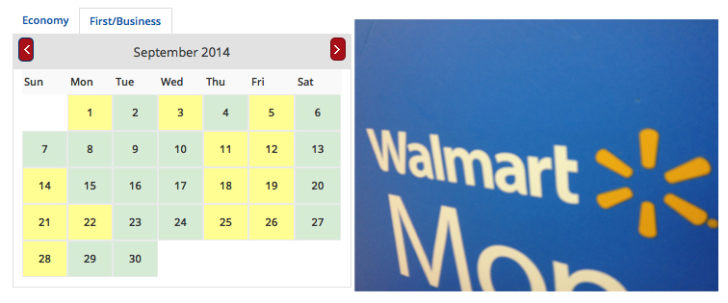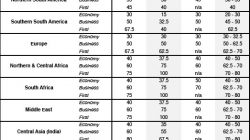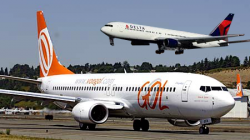From the desk of the Devil’s Advocate…
Before we get rolling this week, I want to send a special shoutout to our friend (P)lucky for being such a good sport about my post last week mocking his love of Lufthansa (see “Will A Certain Fellow Blogger Please Calm Down About Lufthansa“). If you didn’t get a chance to read Lucky’s personal response, it is both classy and entertaining, just like the man himself. Lucky, my friend, you are truly number one in my book when it comes to your knowledge and passion about first class travel (and trashy reality television). Thanks for playing along with me.
That brings us to this week’s topic, which happens to be inspired by Lucky’s presentation at FTU Advanced a few weekends ago (and yes, I promise we’ll stop talking about Lucky after this week because we certainly don’t want him to find out we actually listen to what he says).
Conventional Wisdom in our community tells us this may be the dying days of our hobby. Revenue-based redemption systems across all the airlines are just a few years away, they say. Several low cost carriers already have fixed redemption rates that make it impossible to get outsized value for their loyalty currencies. It’s only a matter of time, we’re told, before the legacy carriers follow suit.
I disagree. And I’m not alone.
During Lucky’s presentation at FTU Advanced (and in his previous posts on “One Mile at a Time”) he argued that the airlines actually spend less money on partner redemptions than they do on merchandise redemptions or potentially even on award seats in their own planes. He believes that if the people who crunch the numbers at the legacy carriers really understand their business, they won’t switch to a revenue-based redemption system anytime soon.
I think he’s right. I think the current region-based award charts are here to stay.
But not only for the reasons Lucky thinks.
Shall I explain? (I’ll pretend you said “Yes, please do” instead of asking if there were any more of those little hot dogs left).
If Southwest is Apples, Delta Isn’t Just Oranges. They’re Watermelons.
Gary Leff at “View From The Wing” reports that his sources tell him Delta actually planned to move to a revenue-based redemption system at the same time as their announced changes to the earning side starting in 2015, but either couldn’t figure out the I.T. or got worried they’d lose their best customers.
While I know Gary has excellent contacts in the industry, I have some doubts about that report. Because while we all agree that Delta’s I.T. isn’t quite as reliable as a WalMart MoneyCenter kiosk, it’s still not that hard to write a line of code that reads “1 SkyMile = 0.8 Cents” and call it a day. Even a floating valuation is easier to handle than the completely inept multi-tier system Delta currently takes pride in calling the SkyMiles Rewards Program.

But let’s go with it for a moment. Let’s say that Delta, United, and American/US Airways are looking at Southwest, JetBlue, and Virgin America and salivating over their business models. “Southwest made the change to revenue-based redemptions in 2011 and they’ve remained just as profitable,” the Conventional Wisdomers point out. “So why wouldn’t the legacy carriers follow suit?”
Well, for one thing, the legacy carriers are absolutely nothing like the low cost carriers. I realize others have made this point before, but it bears repeating here. As an example, Delta is a huge airline with many international routes and frequent business travelers. Southwest is primarily a domestic carrier catering to the occasional flyer who doesn’t realize that scrambling for a seat as if it’s the kickoff to an XFL game is not the normal manner of boarding an airplane.

As far as other low cost carriers, JetBlue is even smaller than Southwest and less profitable than the current Delta, and Virgin America can barely eke out a profit in any given quarter. So why would Delta or any legacy carrier want to emulate them?
Then Do It! I Dare You! Just Go Ahead and Do It Already!
But even if it were the case that the majors wanted to copy the minors, then what exactly is everyone waiting for? United had a massive devaluation just this past February. If they wanted to go with a revenue-based redemption system, couldn’t they have easily done it then?
“United’s being run into the ground,” respond the Conventional Wisdomers. “They can’t afford to take the risk of ticking off the customers they have left.”
Well, United certainly is a poorly run airline, but they didn’t seem worried about upsetting their customers when they directly copied Delta’s revenue-based earning system, did they? Now they’re in the process of trying to cut $2 billion in expenses. If revenue-based redemptions are so much cheaper for an airline, wouldn’t a change like that help accomplish their goal?
What about American/US Airways? Does anyone really think they’re going to unveil a revenue-based redemption system when the new AAdvantage program is announced?
“Maybe not, but they want to,” argue the Conventional Wisdomers. “They just can’t do it because the Justice Department gave them so much trouble over the merger in the first place.”
OK, but the merger has already been approved. It seems unnecessary to be worried about appeasing the Justice Department now, don’t you think?
That leaves Delta, and we’re told that Delta wanted to do it, but were too incompetent or got cold feet. That seems unlikely on both counts. The idea that the most profitable airline in the history of the United States of America either couldn’t handle the I.T. of a simple fixed-currency redemption system or was too scared to do it just doesn’t add up.
There’ll never be a better time for Delta than right now, while they’re at the peak of their market power, to make a major change. So if they’re too scared to do it now, we can all relax. Because that means they’ll never do it.
“Bob” in Accounting Has Some Concerns
But there’s another reason for the legacies to remain on their current systems. It’s what I call the “funny money” problem.
When airlines issue loyalty points or miles, they have to account for those miles as a liability on their balance sheets. In the case of a revenue-based redemption program, that liability is extremely easy to compute. Multiply the number of outstanding miles by their fixed value and you’ve got your current liability.
But with systems that aren’t revenue based, there’s no definitive valuation of an individual mile. Therefore, there’s a lot more play in those numbers, and you better believe the airlines are using that play to their advantage. Which means moving to a revenue-based redemption system is going to require an adjustment to their books on the liability side, and it’s not likely to be an adjustment that’s favorable to the airlines.
So to make the change, not only do you risk ticking off your most valued customers, you also potentially have to take a large charge on your books just to cover the switch. All of this to get away from a system where most partner redemptions don’t cost that much and you can entirely control seat availability on your own planes.
The Devil’s Advocate says award charts aren’t going anywhere.
Most major international airlines also have some version of a region or distance-based redemption system. One could argue that’s because international airlines often look to U.S. carriers to lead the way when it comes to running their businesses.
But in the end, we can’t forget the main reason for loyalty programs in the first place — free flights that people couldn’t otherwise afford. That big international premium redemption is the carrot, the light at the end of the tunnel that makes collecting miles worth doing in the first place. Most people will never redeem for those high-end awards anyway, but the idea of them keeps them going in the program, whether it be by flying a preferred airline or via the primary credit card in their wallet. And that’s exactly what the airlines want.
So let’s cut back on all the doom and gloom. Yes, there will be future devaluations. That’s inevitable given the number of miles and points flooding the systems nowadays. And eventually one of the legacy carriers might finally stick their toe in the water to try some version of a revenue-based redemption system. Even then it probably won’t be a full-scale revenue-based system, but rather some sort of hybrid, like the way Delta’s Pay With Miles system exists side-by-side with their normal award charts.
But I’m so certain we’ll never see all the legacies go to a complete revenue-based redemption system that I’ll promise right here, right now that if it ever happens, I will eat my hat. Even though that’s weird. I mean, why do people say that? Was there a time when gamblers routinely wagered eating their hats? Heck, I don’t even have a hat. I guess I could borrow someone’s hat. Does Lucky wear hats? If I have to eat a hat, I’ll bet he’ll gleefully find me one.
Devil’s Advocate is a weekly series that deliberately argues a contrarian view on travel and loyalty programs. Sometimes the Devil’s Advocate truly believes in the counterargument. Other times he takes the opposing position just to see if the original argument holds water. But his main objective is to engage in friendly debate with the miles and points community to determine if today’s conventional wisdom is valid. You can suggest future topics by sending an email to dvlsadvcate@gmail.com.






